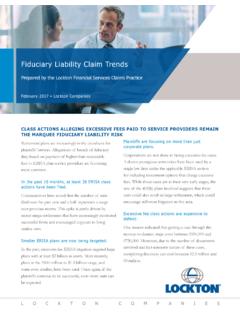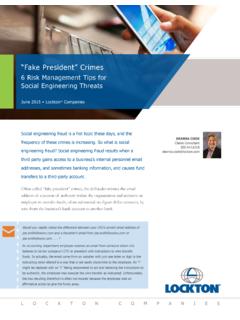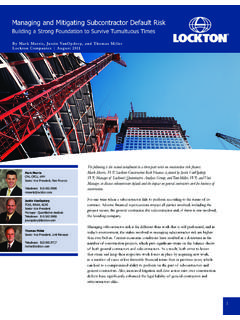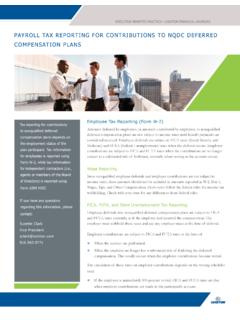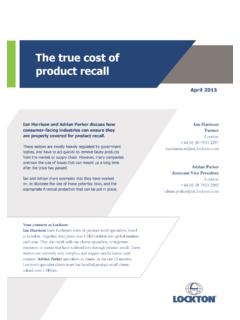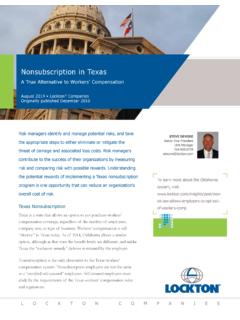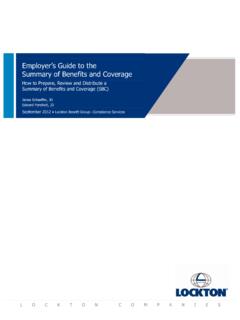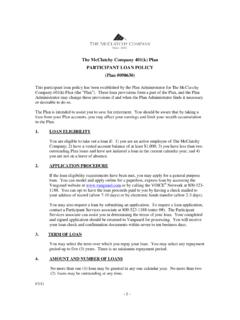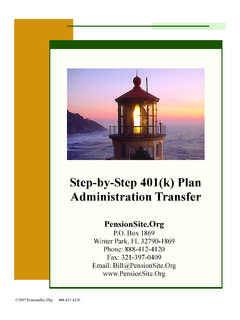Transcription of Final Paychecks and Your 401(k) Employers Should …
1 June 17, 2011 Legislative Guidance Alert Final Paychecks and your 401(k) Employers Should Examine Their Payroll Procedures It is common for a Plan Sponsor to feel comfortable with an internal payroll system they have used for a long time or to rely on a system that is highly automated. However, Employers Should ensure that their payroll system properly addresses an employee's Final paycheck with regards to their 401(k) contributions.
2 your employee terminates and you are processing their Final paycheck , do you withhold for their 401k? THE RULE: Once an employee terminates, severance pay not earned prior to termination cannot be contributed to the 401(k) plan. The employee can make a contribution from their check when they are being paid for sick, vacation and other leave as well as regular pay, commissions, overtime, shift differential pay, and bonuses earned prior to their termination. The employee must have a salary deferral agreement in place in the month prior to receiving the last paycheck .
3 The contribution must be sent to a plan within 2 months after the employee's separation from employment. CORRECTING ERRORS: One of the biggest problems occurs where a plan document restricts participation to current employees. Many automated payroll systems treat the employee's Final paycheck the same as prior Paychecks and withhold accordingly, but a plan doesn't permit terminated employees to contribute. There are two ways to fix: If the contribution has not been deposited into a plan yet, it must be reversed and paid to the employee as wages.
4 If the contribution has already made it to a plan, the employer may either follow complex IRS corrective procedures for excess allocations or move the contribution [Type text] into a plan's suspense account and pay the employee for the amount of the error. SUMMARY: On an individual basis, the administrative burden of curing a mistake may not be too cumbersome, but for a reduction in force or a significant company-wide layoff, the failure to follow the rules could be costly. Take the time to ensure your payroll system can properly handle the Final paycheck 's 401(k) contribution.
5 Fiduciary Risk Management: Compliance Services Sam Henson, JD l Jessica Skinner, JD Securities offered through Lockton Financial Advisors, LLC a registered broker-dealer and member FINRA, SIPC. Investment advisory services offered through Lockton Investment Advisors, LLC, a SEC registered investment advisor. For California, Lockton Financial Advisors, LLC, Lockton Insurance Services, LLC, license number 0G13569. Nothing in this message Should be construed as legal advice. Lockton may not be considered your legal counsel and communications with Lockton's compliance services group are not privileged under the attorney-client privilege.
6 Circular 230 Disclosure: To comply with regulations issued by the IRS concerning the provision of written advice regarding issues that concern or related to federal tax liability, we are required to provide to you the following disclosure: unless otherwise expressly reflected herein, any advice contained in this document (or any attachment to this document) that concerns federal tax issues is not written, offered or intended to be used, and cannot be used, by anyone for the purpose of avoiding federal tax penalties that may be imposed by the IRS or promoting, marketing or recommending to another party any matters addressed in this document or any attachment.
7
